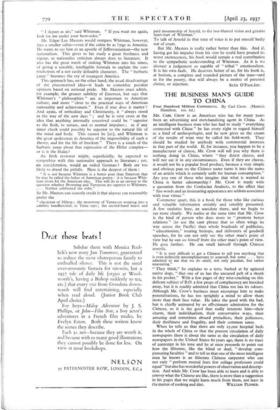THE BUSINESS MAN'S GUIDE TO CHINA Four Hundred Million Customers.
By Carl Crow. (Hamish Hamilton. los. 6d.) MR. CAnt. CROW is an American who has for many years been an advertising and merchandising agent in China. As an intelligent business man who has had to study " everything connected with China " he has every right to regard himself as a kind of anthropologist, and he now gives us the cream of the results of what may be called his field-work. They
should be studied by anybody with commercial interests
in that part of the world. If, for instance, you happen to be a manufacturer of cheese, Mr. Crow will tell you why there is
nothing doing in China, where " they detest cheese, and will not eat it in any circumstances. Even if they ate cheese, it would not be a popular food product, because a very simple and obvious pun on the Chinese name turns it into the name of an article which is certainly unfit for human consumption." Are you one of those who imagine that what is wanted in China is better salesmanship ? Mr. Crow is ready with a quotation from the Confucian Analects, to the effect that " fine words and an insinuating appearance are seldom associated with true virtue."
Commerce apart, this is a book for those who like curious and valuable information amiably and sensibly presented. A few statistics here, an anecdote there, and we begin to see more clearly: We realise at the same time that Mr. Crow is the kind of person who does more to " promote better relations " (to use the cant phrase that so often wings its way across the Pacific) than whole boatloads of publicists, " educationists," touring bishops, and deliverers of goodwill speeches, for he can not only see the other man's point of
view but he can see himself from the other man's point of view.
He goes further. He can smell himself through Chinese nostrils.
" It is, very difficult to get a Chinese to tell you anything that is even indirectly uncomplimentary to yourself, but some . . . haie admitted to me that we do smell, not only peculiar, but rather nauseating."
" They think," he explains to a tyro, barked at by agitated native dogs, " that one of us has the uncured pelt of a skunk in his pocket." With a few pages of dry wise-cracking on this delicate subject of B.O. a few props of complacency are knocked away, but it is readily admitted that China too has its odours.
Although Mr. Crow's business must encourage him to make generalisations, he has too sprightly a mind to allow them more than their face value. He takes the good with the bad, but is chiefly animated by an affectionate admiration for the Chinese, so it is the good that really interests him—their charm, their individualism, their conservative ways, their amusing and sometimes absurd prejudices, their politeness, their thriftiness and frugality, and their common sense.
When he tells us that there are only 25,000 hospital beds in the whole of China or that the present circulation of daily newspapers there is about the same as the circulation of daily newspapers in the United States 6o years ago, there is no trace of contempt in his tone and he at once proceeds to point out how the illiterate, like the blind or deaf, " develop com- pensating faculties " and to tell us that one of the most intelligent men he knows is an illiterate Chinese carpenter who can not only " perform mental feats few college professors could equal " but also has wonderful powers of observation and descrip- tion. And while Mr. Crow has been able to learn and is able to convey what the Chinese are like, there is more than a suggestion in his pages that we might learn much from them, not least in










































 Previous page
Previous page